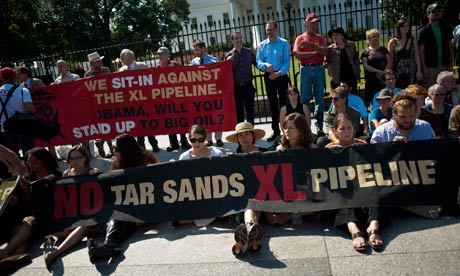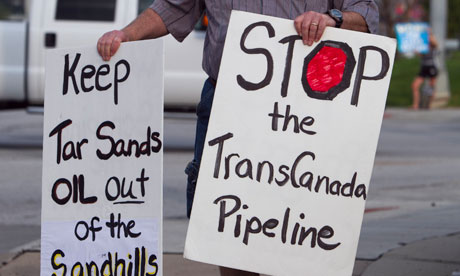1. Crude Oil from Albert has been reported to leave a bigger carbon footprint than conventional oil. The Time article states that to get usable crude from oil sands requires extra energy and in the process leaves a 10-15% larger carbon footprint.
The article also reports that "massive open pit mines" are required to extract the oil, destroying forests and the local environment. These damages take years to recover from and leaves the area in a state of disarray after there is nothing left to profit from and all the oil has been extracted.
 2. The pipeline could pose a threat to the Ogallala Aquifer,one of the world's largest underground sources of fresh water, in Nebraska. In an independent study by Dr. John Stansbury, a Proffesor of Environmental and Water Resources Engineering at the University of Nebraska, a conclusion was made that in reality a major spill would cause far greater damage than in a "worst case scenario" predicted by TransCanada. A spill of tar sands oil is extremely difficult to clean up because the oil separates into two components. The lighter part dissolves into the water and floats downstream. The second heavier portion sinks to the bottom, making it hard to recover. Stansbury references Canadian company Enbridge's Kalamazoo Spill in 2010. It had contaminated more than 40 miles of the river and even now hasn't been completely cleaned up.
2. The pipeline could pose a threat to the Ogallala Aquifer,one of the world's largest underground sources of fresh water, in Nebraska. In an independent study by Dr. John Stansbury, a Proffesor of Environmental and Water Resources Engineering at the University of Nebraska, a conclusion was made that in reality a major spill would cause far greater damage than in a "worst case scenario" predicted by TransCanada. A spill of tar sands oil is extremely difficult to clean up because the oil separates into two components. The lighter part dissolves into the water and floats downstream. The second heavier portion sinks to the bottom, making it hard to recover. Stansbury references Canadian company Enbridge's Kalamazoo Spill in 2010. It had contaminated more than 40 miles of the river and even now hasn't been completely cleaned up.
TransCanada has already had 14 leaks in their existing Kestone pipeline, the biggest leak being 400 barrels. Can we really trust a company that has had 14 leaks already and still looks to expand?
Besides the environment factor, the Keystone XL pipeline could generate $100 billion in profits for the Koch brothers. They have also given up to $50 million to Congressional members who have supported legislation for the pipeline. Should we really continue to support people that are known to look the other way on the climate issue? Is a few thousand jobs worth the potential disaster that a spill will create?
Chris Matthews says, "It's going to happen. It will happen. It'll happen either this year or next year or after ... because the country wants jobs, and energy is always a primary concern of the American people." If the American people care more about jobs and energy and making money then the environmental issue will just be thrown out the window. Can we get our priorities straight America?



Can't America implement conditions in which the pipeline has to agree to to be built? Is there no way to build the pipeline without leaving such a large carbon footprint? If there is, I believe the pipeline would create more jobs in maintenance of the pipeline as well as environmental protection, all while being as green as possible.
ReplyDeleteThe problem is that the process of getting usable crude from oil sands itself leaves a much larger carbon footprint than regular oil. Sure building the pipeline can create jobs, but is it worth the risk of a spill?
DeleteBesides that, several studies predict that after the construction of the pipeline, only a few dozen people will be required to maintain it.
Delete